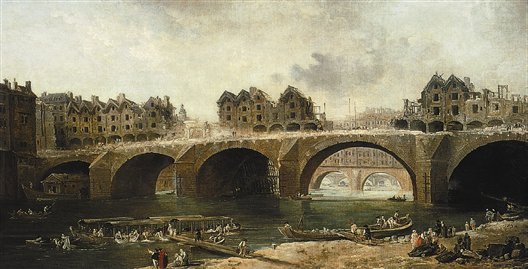Hubert Robert, Demolition of the houses on
the Pont Notre-Dame in 1786, 1786.
Oil on canvas, 73 x 140 cm.
Musée du Louvre, Paris.
Absolutism was the norm, in an era in which rulers possessed unbridled power over their territories and were able to govern without any external controls or any obligation to their subjects. The instruments at their disposal were first and foremost the army, the Legislature with its officials bound by ties of unconditional obedience, the Church and finally the mercantile trading system. This era ended in France around the time of the death of Louis XIV (1715).
Wars
Other significant events during these absolutist years occurred in the first half of the restless 18th century, such as the victory over the Osmans (in 1717) of Prince Eugene of Savoy in the service of Austria. This victory inspired Carl Loewe (1796-1869) to compose the famous song “Prince Eugene, Noble Knight”. During the same year, the Hapsburg Maria Theresa (1717-1780) was born, later named the Archduchess and Queen of Hungary, in whose extensive collection of titles can also be found that of a Roman Empress. In Russia, Tsar Peter the Great (1672-1725) was still on the throne, and in the Italian state of Florence the Medicis continued to reign with Cosimo III (1642-1723). Between 1718 and 1729, and again from 1739 to 1748, England was fighting its wars against Spain, and the Russia-Austria alliance was again fighting the Turks in the 1730s. From 1740 to 1748, the War of the Austrian Succession raged with the First and Second Silesian Wars, in which European powers such as Bavaria, France, Prussia, the Netherlands and, of course, Austria partook.
